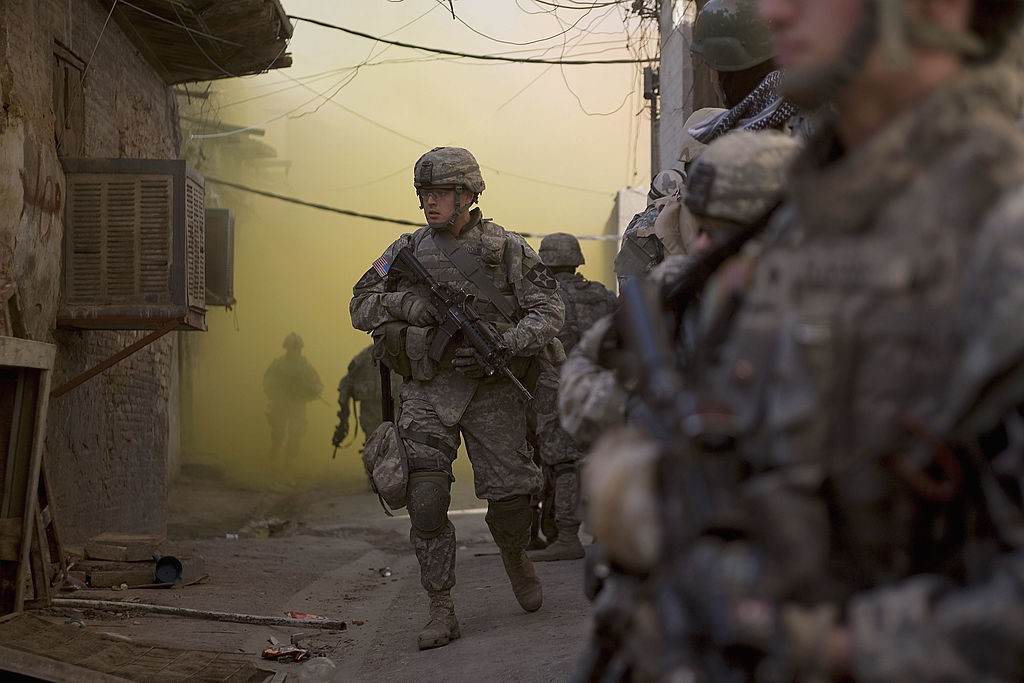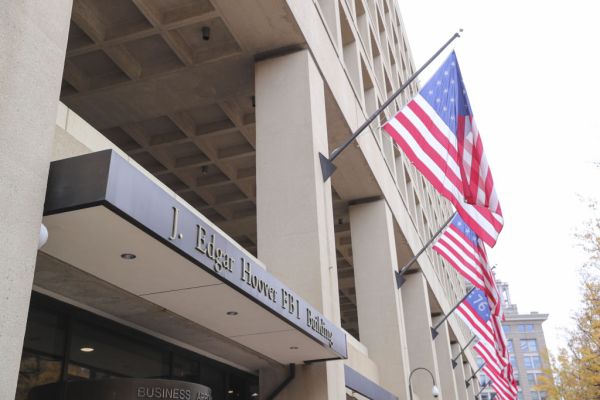I was unfortunate to be present, in a sense, at the creation of the Foreign Intelligence Surveillance Act’s Section 702 as a young CIA case officer in Iraq. On June 16, 2006, in the “Triangle of Death” south of Baghdad, al-Qaeda killed an American soldier and captured two more from the 101st Airborne Division.
When U.S. servicemen go missing in a combat zone, the military declares DUSTWUN—“duty status—whereabouts unknown”—for those GIs. Every American in theater drops whatever he’s doing to try to find missing comrades. For agency case officers, that means triggering dangerous emergency meetings with human sources to glean any information useful to those servicemen’s recovery. To my great frustration, none of my sources offered anything helpful to the search. Every veteran struggles with what to share with civilians upon returning home. Here, it’s important to share a hard fact: One of these soldiers was shot dead resisting abduction, and the others were horribly tortured and mutilated before being murdered.
As I recall, the U.S. picked up cellphone calls and emails, sent over U.S.-based communications networks, between al-Qaeda members within Iraq regarding these American soldiers being tortured, yet the content of these communications did not appear in the cables I read. Back then, a Foreign Intelligence Surveillance Court order was generally needed to collect and disseminate the content of such communications, only because while these messages began and ended with terrorists located overseas, they were sent electronically through servers located in the U.S. I suspect the National Security Agency quietly did the morally correct but unlawful thing and informally shared those communications’ contents with special mission units responsible for hostage rescue.
Despite this intelligence and good Americans’ best efforts, we were all sadly unable to locate these hostages in time. However, the awful incident (and a starkly similar one with 10th Mountain Division soldiers on May 12, 2007) apparently raised to policymakers in a focused way the question of why the U.S. wasn’t routinely collecting and disseminating al-Qaeda communications—conveniently for us routed through American companies’ infrastructure—to our intelligence, law enforcement, and military personnel. That evil but technologically primitive al-Qaeda operatives used American businesses to communicate ought to be a feature, not a bug, of the war on terror; information about the doomed hostages likely shared by NSA with special operators ought not have needed to be passed surreptitiously.
At the end of the day, al-Qaeda cells composed of foreigners and located entirely in Iraq lacked cognizable Fourth Amendment rights. Accordingly in August 2007, a Democratic-majority Congress and Republican President George W. Bush properly amended the Foreign Intelligence Surveillance Act (FISA) to allow, without court order, NSA’s interception of communications between suspected international terrorists—or foreign spies—in which at least one party is reasonably believed to be located overseas. Selected personnel were further allowed to preliminarily query large databases for records of the existence of calls and emails between Americans and suspect parties overseas: looking for U.S. citizens in contact with al-Qaeda’s core leadership in Pakistan, for example, or with hostile intelligence services’ case officers.
Section 702 of FISA has successively undergone several limiting amendments since then. This is because while NSA, CIA, and the Pentagon are in my experience careful in their application of Section 702, FBI personnel far more often abuse their statutory authority—perhaps simply because the bureau and the Justice Department hesitate to investigate and prosecute their own law enforcement colleagues.
FBI abuses of FISA more broadly came to a head during the 2016 presidential election campaign. Bureau lawyer Kevin Clinesmith, in seeking reauthorization of a FISA application on Trump campaign foreign policy adviser Carter Page, knowingly made a false statement to a FISA judge about the status of Page’s cooperation with the U.S. government after Russian intelligence asked Page, a former U.S. naval intelligence officer, to spy for Moscow. Clinesmith’s gross error resulted in both a guilty plea by him and a collapse of political support for FISA in general, especially from congressional Republicans previously supportive of this unique authority.
Section 702 is now up for periodic reauthorization, and the outcome is seriously in doubt. Yet Congress and President Joe Biden ought to reauthorize Section 702, and here’s why.
First, last year 60 percent of information in the President’s Daily Brief—the holy of holies of intelligence information—derived from Section 702 collection. Right now the U.S. faces terror threats from the Islamic State, resurgent in Afghanistan and recently launching attacks in Turkey, Iran and Russia. We regularly repel attacks on American and allied naval and merchant shipping off the coasts of Yemen, and suffer attacks on U.S. military forces in Iraq and Jordan. The U.S. anticipates Iran’s Islamic Revolutionary Guard Corps-Quds Force (IRGC-QF) and its handmaiden Hezbollah imminently retaliating against us and Israel for Tel Aviv’s dramatic April 1 attack on senior IRGC-QF officers at Tehran’s consular building in Damascus, part of the Jewish state’s response to Hamas’ genocidal October 7 attack from Gaza. To suddenly deny an American president three-fifths of his intelligence at this moment would be wildly irresponsible, especially with the 2024 Paris Olympic Games this summer tied up like a fatted calf as a terror target. U.S. senators and representatives inclined to deauthorize Section 702 should consider how they might explain their votes in the aftermath of an attack like that of Palestinian Liberation Organization terrorists at the 1972 Munich Games on Israeli athletes, or our own, if we deliberately chose not to collect available intelligence that might have prevented any such attack on the 2024 Games.
Second, hostile foreign powers, including Russia, are attempting to interfere with the 2024 presidential election. The rapid progress of convincing deepfake technology makes the risk of an adversary service launching an October surprise greater than in the 2020 or 2016 elections, in which Russian intelligence did interfere (albeit without provable cooperation by Donald Trump’s campaign), first to cast doubt on the process and undermine an expected Hillary Clinton presidency, and then to boost Trump’s candidacy when he seemed sympathetic to Moscow. The risk of domestically fomented political violence between November 5, 2024, and January 20, 2025, is already far too high. We ought not make President Biden and nonpartisan career national security officials deaf, dumb, and blind to foreign attempts to capitalize on civil unrest, especially when enemy threats to us and our NATO, South Korean, and Taiwanese allies persist.
Opposing Debate
Finally, while the executive branch never challenged it as such, the entirety of FISA is arguably unconstitutional. The commander in chief of the U.S. armed forces maintains necessary and proper powers to provide for the common defense. Every American president of both parties between Franklin Roosevelt and Gerald Ford understood these powers to include signals intelligence—the interception, decoding, and analysis of enemy communications—without reference to any authorizing statute. FISA recognizes this practical reality in that even under its terms, the attorney general may temporarily authorize the domestic collection of signals intelligence in national emergencies without any court authorization. Rather than risk a separation-of-powers crisis in which an executive is tempted by exigent circumstances to ignore the legislative and judicial framework of FISA, a showdown Congress might well lose in the courts, Congress would be well-advised to reform FISA rather than deauthorize Section 702.
For example, at present only the Department of Justice typically argues before the FISA court, so it’s unsurprising that over a five-year period, that court denied just one of DOJ’s 8,164 surveillance applications. There’s limited authority for that court to hear, only at its judges’ request, from friends of the court beyond DOJ lawyers. Instead, why not mandate that cleared counsel, similar to federal public defenders, regularly argue against granting the government’s FISA applications?
These lawyers could insist that ordinary, Fourth Amendment search warrant probable-cause standards should apply to a government surveillance application, and not lower FISA standards. There are two sides to most stories; making FISA hearings adversary proceedings, and not one-sided, might substantially reduce abuses of Section 702 specifically, and of FISA in general.
But deauthorizing Section 702 authority entirely would be to rashly throw the baby out with the bathwater, even as our country faces a particularly perilous time over the next 10 months.





Please note that we at The Dispatch hold ourselves, our work, and our commenters to a higher standard than other places on the internet. We welcome comments that foster genuine debate or discussion—including comments critical of us or our work—but responses that include ad hominem attacks on fellow Dispatch members or are intended to stoke fear and anger may be moderated.
With your membership, you only have the ability to comment on The Morning Dispatch articles. Consider upgrading to join the conversation everywhere.